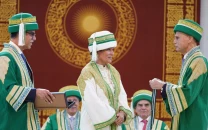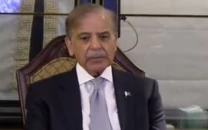Education emergency in Balochistan
The crackdown on cheating is welcome, but it's not a solution to the problem of low literacy

The writer is a freelance journalist based in Quetta and former staff reporter of The Express Tribune
This year’s 44 per cent success rate stands in stark contrast to the 75 per cent attained by students in 2014. The poor results come on the heels of a campaign against rampant cheating, launched by Dr Abdul Malik Baloch. A senior official of Balochistan’s education department, who has been affiliated for many years with the BISE, states that cases of cheating this year were reduced by 50 per cent as a result of the government campaign. The provincial chief secretary appointed 16 secretaries who, along with commissioners, deputy commissioner and assistant commissioners, paid regular visits to examination sites across Balochistan during exam time. There was huge investment in putting up roadside hoardings, organising seminars and walks, and publishing advertisements to raise public awareness about the problem of rampant cheating. This year these officials visited only urban areas like Quetta and district headquarters. Next year, they will extend their monitoring to the remote areas of the province. With the deployment of senior officials and a more rigorous monitoring system in remote areas, it is expected that next year’s board results will be even worse.
The crackdown on cheating is a welcome move, but not really a solution to the problem of low literacy and inaccessibility to basic education. The main problem is not the cheating but the ill-equipped teachers, who are not truly invested in the schools and the success of their students. The majority of teachers draw salaries without actually showing up to teach their classes despite attempts by the chief minister to rectify the situation. The ruling National Party, and its coalition partners Pashtunkhwa Milli Awami Party and the PML-N have huge vote banks controlled by school and college teachers. It is against the law for a government school teacher to engage in politics or be part of a union, and yet many are publicly involved. In one blatant case, a government school teacher even delivered a speech during a public gathering of the ruling party. How can anyone expect good results when teachers are neglecting their classes in order to participate in politics? An MPA in interior Balochistan went so far as to warn the education department against making teachers — his supporters —accountable for their attendance. In Balochistan you are more likely to see teachers staging protest demonstrations than actually teaching in the province’s schools and colleges.
Besides the problem of absentee teachers, there are thousands of schools with just one teacher and one classroom. The chief minister allocated Rs1 billion for the improvement of facilities but, given the culture of impunity in Pakistan, it is yet be determined whether this amount was actually spent on schools or simply went to line the pockets of the corrupt. According to Alif Ailaan, a non-profit organisation, around 80 per cent of students do not get as far as their 10th grade matriculation. Government numbers paint a somewhat rosier picture, but since the government does a poor job maintaining its own statistics, their claims cannot be substantiated.
Compounding the problem is the fact that a huge number of children do not attend school at all. The statistics are alarming and do not seem to be improving. A few days ago, it was discovered that a girls’ school in Killah Abdullah had not held classes for at least five years. Similarly, ‘ghost’ schools exist in almost every district. The Balochistan government insists that by increasing the budget for education and imposing emergency measures, it is making education a priority. It remains to be seen whether money and emergency measures will yield results. Meanwhile, people in interior Balochistan continue to lodge complaints about ghost schools, absentee teachers and negligence on the part of the authorities. The truth of the matter is that the state of education in Balochistan is a complete mess. Band-aid solutions will not help. If the province is to ever compete with other provinces, urgent and significant measures must be taken. Given the current political climate, I do not think the government alone will be able to improve the quality of education. The educated Baloch must do their part to highlight issues relentlessly until they are addressed. The majority of people cannot afford private schooling for their children, and the education provided in most government schools is not worthy of the name. The educated Baloch need to accept the responsibility to fight for an educated Balochistan and to make the government accountable for failing to fulfill its constitutional obligation. The future of this province depends on it.
Published in The Express Tribune, September 30th, 2015.
Like Opinion & Editorial on Facebook, follow @ETOpEd on Twitter to receive all updates on all our daily pieces.















COMMENTS
Comments are moderated and generally will be posted if they are on-topic and not abusive.
For more information, please see our Comments FAQ